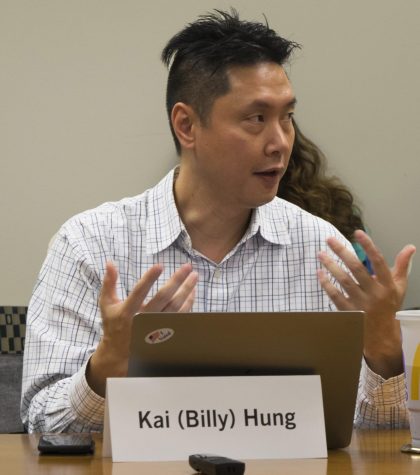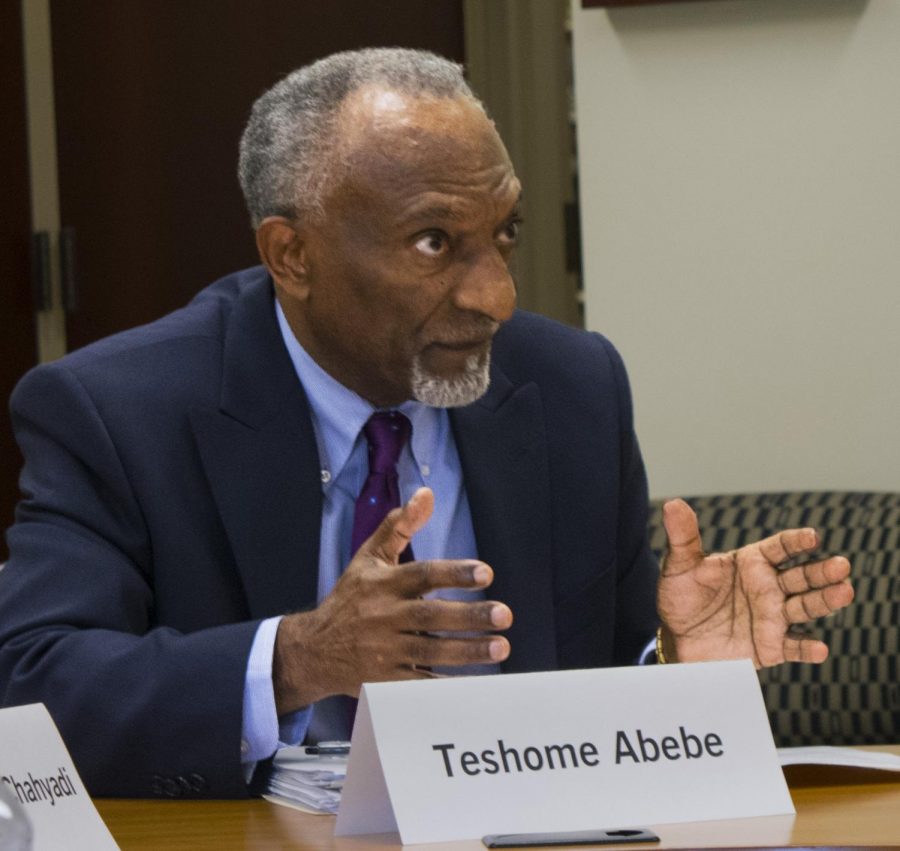Faculty Senate sets January as end date for resolution on shared governance
Brooke Schwartz | The Daily Eastern News
Teshome Abebe, a member of the Faculty Senate and economics professor, at the Faculty Senate meeting Tuesday in Booth Library. The senate discussed shared governance and possible ways to boost communications between organizations on campus.
September 18, 2018

Billy Hung, the Faculty Senate recorder and biological sciences professor, at the Faculty Senate meeting Tuesday in Booth Library.
After a year of discussion, the question of what to do about the Higher Learning Commission’s concerns with Eastern’s organizational communication is coming to a potential end.
Many solutions and ideas have been discussed, and at Tuesday’s Faculty Senate meeting, an official end date for the resolution was set to be, ideally, this upcoming January.
At a senate meeting last semester on Jan. 23, 2018, Council of Academic Affairs members went to the meeting, much like they came to the most recent senate meeting, and shared governance was discussed in many of the same ways as it was on Tuesday.
An underlying discussion of Faculty Senate’s larger role on campus and in other organizations was discussed at both meetings this September and last January.
Jeff Stowell, senate vice-chair and psychology professor, has been leading discussions and creating plans since those first meetings last year as a part of the senate shared governance subcommittee.
At Tuesday’s meeting, Stowell said he believes a change needs to happen to clarify the senate constitution, which currently says that CAA, the Council on Graduate Studies and the Council on Teacher Education are populated by the senate, but are part of “the Faculty.”
“I think we should start back at the beginning, which is what is (the senate) constitution saying about our relationship (concerning organizations), and presently we specify their existence, we say they shall be committees of the faculty, and then we really don’t specify anything about what (the senate does) with them,” Stowell said. “We spawn them, and then we orphan them.”
He said he thinks having a clear relationship and connection to these other organizations is important in the senate constitution.
“I might suggest, that if one word was added to the constitution that says these are committees of the faculty senate, then suddenly we have a relationship, which we then want to cultivate with these other committees,” he said. “We’re not claiming any more power than we already have; it gives us reason to collaborate more and feel like we are connected in some way.”
Rebecca Throneburg, a CAA member and a communication disorders and sciences professor, was in the audience at the senate meeting and she said she strongly disagreed with Stowell’s solution.
“(Adding senate) says that basically CAA is a subgroup of Faculty Senate, and I‘m OK with that, if Faculty Senate is a representative body of the other people. Many of the other universities, Faculty Senate has … two people from CAA, or it’s all members of CAA. Then if you have a seat on the senate, you’re a member of the other body that you’re elected to serve,” Throneburg said. “If Faculty Senate is a representative body of those people, then … OK, fine. Otherwise, we really don’t like the model of CAA, COTE is a committee of the senate with a liaison being a part of that. (CAA) is opposed to that.”
Billy Hung, senate recorder and biological sciences professor, said he could see both sides of the constitution interpretations.
“I think I echo part of the sentiment from (Stowell) … CAA, CGS, COTE don’t have constitutions, they have bylaws, which is really odd to me, because if they are separate entities, they should have their own constitution for existence. Right now, these committees exist under the constitution of Faculty Senate,” Hung said. “However, if you read the language of the constitution, it refers to ‘the Faculty’, capital f, so it leaves the impression that whoever drafted the constitution considers ‘all of the Faculty on campus’ as ALL faculty. I read it … as the faculty spawns the senate, the COTE, etcetera, but the Faculty Senate is deputized to populate these committees.”
Stowell said he did consult with a former member of Faculty Senate who’s been at Eastern for a long time, and asked him what was his perspective of the intended relationship was between the senate and the other committees.
“He pointed to the constitution of the Faculty Senate, the part that talks about the right to review any matter that concerns faculty as a whole, which includes that from other committees, and it (reiterates) that it may be that the senate would have a different recommendation to the administration than one of these curriculum bodies, that he felt that the senate decision should weigh stronger as the governing voice of the faculty,” Stowell said. “Now, that creates tension with other committees, but this is a Faculty Senate problem: What is our role, and how do we relate to other committees on campus.”
Todd Bruns, senate chair and scholarly communication librarian and institutional repository director, said his solution to this would involve a different change, possibly to the senate’s constitution.
“My concern throughout this whole (shared governance) process has been ‘(does the Faculty Senate) really need to be in the position of essentially rubber-stamping or second guessing our colleagues that are doing important work on COTE, CAA, CGS?’,” Bruns said. “I would like to propose, and this would mean a change to perhaps our constitution, I’m not sure, that we basically create what I would call a Faculty Congress. That congress is composed of four entities: Faculty Senate, CAA, CGS, COTE. So when we have elections, if one of our colleagues runs for CAA, they are representing faculty on the issues that CAA addresses.”
The “Faculty Congress” that Bruns proposed would not meet, but would entail that each entity, the senate, CAA, COTE and CGS, would compose a specific branch of the congress.
“(Faculty Congress) is the organizational umbrella of CAA, which works on curriculum, of COTE, which works on teacher education, CGS, which does what it does, Faculty Senate does everything else,” he said. “It’s basically just codifying and saying CAA, COTE, CGS and Faculty Senate combined represent the faculty.”
Bruns also proposed codifying a regular meeting between the chairs of all the committees where they can discuss current business and topics.
Hung said he felt this proposal was more inline with the intended meaning of the senate’s constitution.
The idea of having a Faculty Congress website, which would house all the organization’s minutes and agendas, also appealed to the senators.
The senate decided to table this discussion until Bruns can get more of his idea on paper and laid out, along with some justifications for how committees are currently set up and some written benefits to either staying with or changing the current structure.
Brooke Schwartz can be reached at 581-2812 or at bsschwartz@eiu.edu.

















![[Thumbnail Edition] Senior Foward Macy McGlone, getsw the ball and gets the point during the first half of the game aginst Western Illinois University,, Eastern Illinois University Lost to Western Illinois University Thursday March 6 20205, 78-75 EIU lost making it the end of their season](https://www.dailyeasternnews.com/wp-content/uploads/2025/03/WBB_OVC_03_O-1-e1743361637111-1200x614.jpg)





















































